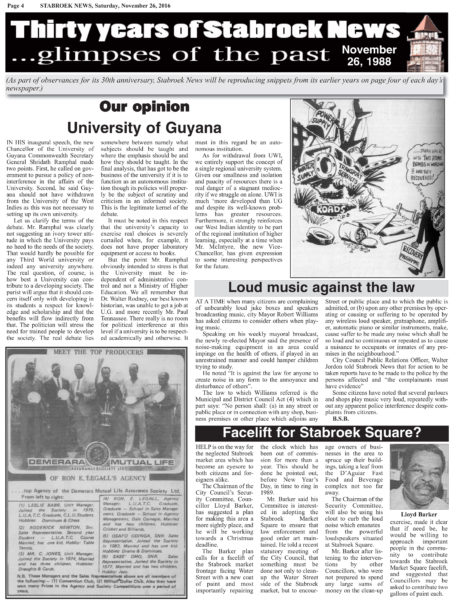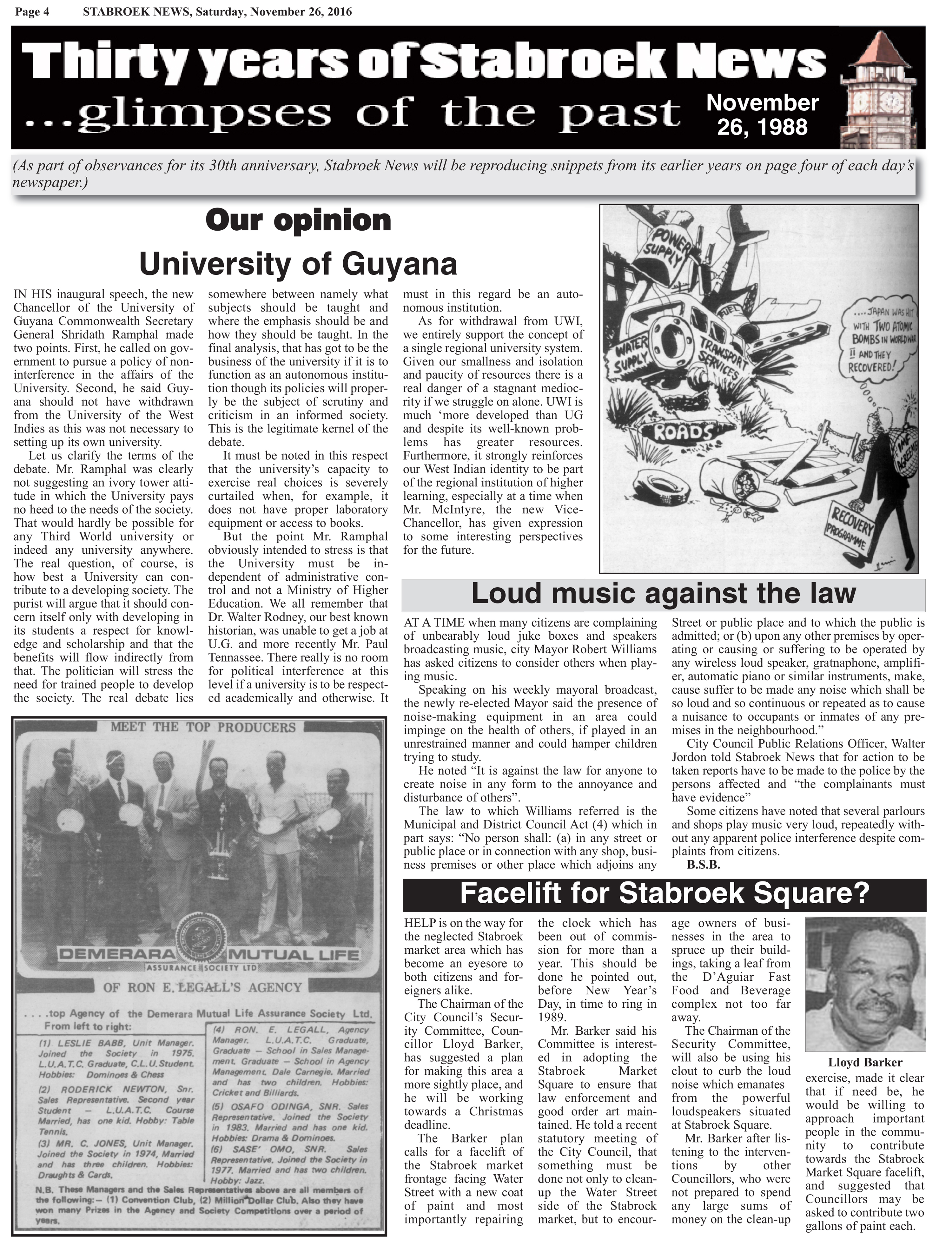IN HIS inaugural speech, the new Chancellor of the University of Guyana Commonwealth Secretary General Shridath Ramphal made two points. First, he called on government to pursue a policy of non-interference in the affairs of the University. Second, he said Guyana should not have withdrawn from the University of the West Indies as this was not necessary to setting up its own university.
Let us clarify the terms of the debate. Mr. Ramphal was clearly not suggesting an ivory tower attitude in which the University pays no heed to the needs of the society. That would hardly be possible for any Third World university or indeed any university anywhere. The real question, of course, is how best a University can contribute to a developing society. The purist will argue that it should concern itself only with developing in its students a respect for knowledge and scholarship and that the benefits will flow indirectly from that. The politician will stress the need for trained people to develop the society. The real debate lies somewhere between namely what subjects should be taught and where the emphasis should be and how they should be taught. In the final analysis, that has got to be the business of the university if it is to function as an autonomous institution though its policies will properly be the subject of scrutiny and criticism in an informed society. This is the legitimate kernel of the debate.
It must be noted in this respect that the university’s capacity to exercise real choices is severely curtailed when, for example, it does not have proper laboratory equipment or access to books.
But the point Mr. Ramphal obviously intended to stress is that the University must be independent of administrative control and not a Ministry of Higher Education. We all remember that Dr. Walter Rodney, our best known historian, was unable to get a job at U.G. and more recently Mr. Paul Tennassee. There really is no room for political interference at this level if a university is to be respected academically and otherwise. It must in this regard be an autonomous institution.
As for withdrawal from UWI, we entirely support the concept of a single regional university system. Given our smallness and isolation and paucity of resources there is a real danger of a stagnant mediocrity if we struggle on alone. UWI is much ‘more developed than UG and despite its well-known problems has greater resources. Furthermore, it strongly reinforces our West Indian identity to be part of the regional institution of higher learning, especially at a time when Mr. McIntyre, the new Vice-Chancellor, has given expression to some interesting perspectives for the future.
Loud music against the law
 AT A TIME when many citizens are complaining of unbearably loud juke boxes and speakers broadcasting music, city Mayor Robert Williams has asked citizens to consider others when playing music.
AT A TIME when many citizens are complaining of unbearably loud juke boxes and speakers broadcasting music, city Mayor Robert Williams has asked citizens to consider others when playing music.
Speaking on his weekly mayoral broadcast, the newly re-elected Mayor said the presence of noise-making equipment in an area could impinge on the health of others, if played in an unrestrained manner and could hamper children trying to study.
He noted “It is against the law for anyone to create noise in any form to the annoyance and disturbance of others”.
The law to which Williams referred is the Municipal and District Council Act (4) which in part says: “No person shall: (a) in any street or public place or in connection with any shop, business premises or other place which adjoins any Street or public place and to which the public is admitted; or (b) upon any other premises by operating or causing or suffering to be operated by any wireless loud speaker, gratnaphone, amplifier, automatic piano or similar instruments, make, cause suffer to be made any noise which shall be so loud and so continuous or repeated as to cause a nuisance to occupants or inmates of any premises in the neighbourhood.”
City Council Public Relations Officer, Walter Jordon told Stabroek News that for action to be taken reports have to be made to the police by the persons affected and “the complainants must have evidence”
Some citizens have noted that several parlours and shops play music very loud, repeatedly without any apparent police interference despite complaints from citizens.
B.S.B.
Facelift for Stabroek Square?
HELP is on the way for the neglected Stabroek market area which has become an eyesore to both citizens and foreigners alike.
The Chairman of the City Council’s Security Committee, Councillor Lloyd Barker, has suggested a plan for making this area a more sightly place, and he will be working towards a Christmas deadline.
The Barker plan calls for a facelift of the Stabroek market frontage facing Water Street with a new coat of paint and most importantly repairing the clock which has been out of commission for more than a year. This should be done he pointed out, before New Year’s Day, in time to ring in 1989.
Mr. Barker said his Committee is interested in adopting the Stabroek Market Square to ensure that law enforcement and good order art maintained. He told a recent statutory meeting of the City Council, that something must be done not only to clean-up the Water Street side of the Stabroek market, but to encourage owners of businesses in the area to spruce up their buildings, taking a leaf from the D’Aguiar Fast Food and Beverage complex not too far away.
The Chairman of the Security Committee, will also be using his clout to curb the loud noise which emanates from the powerful loudspeakers situated at Stabroek Square.
Mr. Barker after listening to the interventions by other Councillors, who were not prepared to spend any large sums of money on the clean-up exercise, made it clear that if need be, he would be willing to approach important people in the community to contribute towards the Stabroek Market Square facelift, and suggested that Councillors may be asked to contribute two gallons of paint each.





